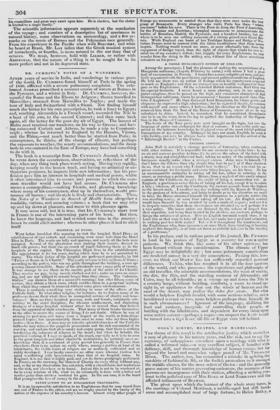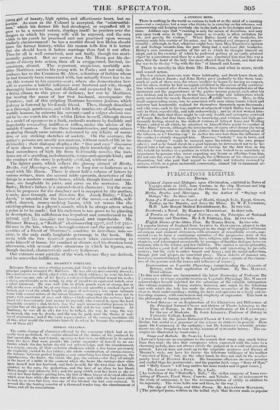HOOK'S BIRTHS, DEATHS, AND rd A rti.stnns.
Tut, theme of this novel is the retributive justice which overtakes a man of' pleasure in his mature years, and the risk, not to say the certainty, of unhappiness ettendant upon a marritige with what is called a reformed rake,—a very excellent subject, if handled with delicacy, skill, and thorough knowledge of human nature, but far beyond the broad and somewhat vulgar pencil of Mr. Timm-Ian Ilimmt. The author, too has committed. a mistake in quitting the outskirts of Ihshionable life, or the leash pretenders to it amonest the middle classes, fbr the more select of' the ton : and the generally grave nature of Ids matter preventing caricature, the manners aids persons are incongruous with their station, affording a striking con- trast to the polished ease of Mrs. Gotta or Lord Noant.exar and the affected refinement of &mum.
The pivot upon which the interest of' the whole story turns, is the marriage of' Colonel Mortimer, a middle-aged but still hand- some and accomplished roué of large fortune, to Helen Batley, a
young girl of beauty, high spirits, and affectionate .heart, but no portion. As soon as the Colonel is accepted, the "mistrustful-
ess," which his former life had developed, or engrafted till it n grew to be a second nature, displays itself: he ponders over the dangers to which his young wife will be exposed, and the arts which in his youth be practised and saw practised upon women similarly circumstanced : he has a morbid dread lest Helen should know his former history, whilst his reason tells him it is better that she should learn it before marriage than find it out after. Thus for all is well conceived, and not badly, though too senti- mentally painted. But no sooner does Mr. How( put his ele- ments of misery into action, than all is exaggerated, threical, in-
consistent, absurd. The repentant, suspicious, morbidly sen- sitive Mortimer, carries his young wife to Paris ; and not only in- troduces her to the Countess St. Aline, a demirep of ihshion whom he had flwinerly been connected with, but actually threes her to in- vite this woman to his country-seat ; where she domesticates her- self to exercise a baleful influence over husband and wife, though thoroughly known to him, and disliked and suspected by her. As a fitting climax to this piece of delicacy, her son by :Mortimer, hut hearing the name of her first husband, accompanies the Countess; and of this stripling -Mortimer becomes jealous, which jealousy is fostered by his female friend. Then, though described as a thorough gentleman, and with lofty sentiments of delicacy and worldly honour, he suborns his servant—and a vulgar obvious ras- cal he is—to watch his wife ; whilst Ilelen herself, although drawn as a model of openness to a fault, embroils matters by foolishly and improbably concealing indifferent trifles, under the advice of the amiable Countess. Nor are these inconsistencies, and many others as glaring though more minute, redeemed by any felicity of narra- tion, or any striking sketches of society. On the contrary, the author's persons are mostly automatons, without much of life or in- dialuality ; their dialogue displays the " free and easy" discourse of men about town, or women gaining their knowledge of the re- filled naturalness of high life from flishionable novels; the inci- dents are of a startling, nelodramatie, rouge-and-spangle kind ; and the conduct of the story is palpably artificial, without art.
The lighter parts, which relieve the gloomy absurd of Births, Deaths, and Marriages, are neitlter so long nor so ludicrous as is usual with Mr. liooa. There is about half a volume of letters by various writers, ftom the second table upwards, descriptive of the doings in a modern country-house, which, though forced and over- done, are laughable in parts, and carry on the narrative. Mr. Batley, Helen's father, is a natural-drawn character ; bnt the scene where he proposes for the daughter and is accepted by the mother, is stale, seen through, and therefore flat. Jacob Batley, " Uncle Jacob," is intended for the humorist of the novel,—a selfish, self- willed, shrewd, money-making hunks, with set terms like the catching-phrase in a iilaver's mouth, which he always utters when a point is to be made : hut his rudeness is too gross to be pleasing in description, his selfishness too impudent and unredeemed to be
natural, ttd1..!;; rai:611iiy ino Inti,;Iteed and improbable. Mr. Brimmer Brassey, a "Radical" electioneering agent, and Frac-
titir)ner in the law, whom a borough contest and the pecuniary ne- cessities of a friend of Mortimer's combine to introduce into so- ciety, is the only really laughable personage in the book. This scene with the two reserved gentlemen when endeavouring to snake himself at home, his conduct at dinner, and his drunken bout afterwards, with several other situations in which he figures, arc, though farcical, characteristic and very ludicrous. Our extracts must partake of the work whence they are derived, anti be somewhat indifibrent.
MR MASSEY'S PORTRAIT.
Brimmer Brassey Wag a stirring person, and likely to make but, e1f and his principal popular aniong.st the Radicals. Ile was always over-suitertly dressed ; his countenance Was florid, edged with inuell !dock whisker ; he wore his hat- s silk hat—On one side of his heal ; a colteued handkerchief round his mck ; a chain, questionable as to metal, by way of eleird to an equivocal watch, over a velvet waistcoat. Ile was well able to drink punch weak or strums, hot or cold, as the ease might be at any time, and in ally quantity ; smokeecigars if desirid, and went the whole length of pipes if necessary ; was mutton intimate terms it ith several actors of the minor theatres ; sang songs which were not in priut ; t,dd anecdotes of men and thins which ast.inished the natives ; had a tritest \vim benevolently lent money Cu, anylsuly who wanted it, upon the least imaginable security ; until, in fact, was 'Cie most accommodating, person in his peculiar line of the profession to which he did not do too much honour. At Mtufintry, he was all in all ; the wit he talked, the way he saug, the wav he dressed, the way lie drank, and the way he paid, were the theme of uni- versal admiration ; and if the mere representative of the vowing candidate did. all this, what would time candidate himself do elan he became the representa- tive of them all?
IIIRDAL FEELINGS.
The entire change of character effected lee the csremony which hal so re-
cently been performed, the entire alteratim■ of tin, duties of life produced by that sacred rite, the vast futurity opening to her view, so different in its nature from the days that were passed ; the claire surrender of herself to an au- thority which the day before she did not acknowledge, and the abandonment, to it certain extent, of that exclusive obedience it a few hours previousLy Slid implicitly yielded to her father ; the imliole combination of circumstances, the balance between perfect happiness and something, less than happiness, the nintrehension, the doubt, the dread, the jov, the sorrow,—Ihr they all mingle in the heart of' it bride at the moment whom she hears the carriage-door close upon herself and her husband, and finds litrself, for the first thae in her life, confided to the care, the protection, and the love of an alien to her blood, Beim deeply and intensely felt ; and the pang which rent her heart as she re- ceived her fond father's parting kiss, the last a those kisses of devoted affection which were hers while she alone was all his Care, and while she had none other to look to or love but him, was one of the biterest she haul ever endured. It seemed like the tearing asunder of a thousaud tender ties, the abandonment of home, and all its asseciatium4.
A CUNNING MIND.
There is nothing in the world so curious to look at as the mind of a cunning- man—not a conjurer, but a man who thinks he is carrying on his schemes, a,,d. maneuvering and keeping everbody else in the dark as to his designs and inten- tions. Addison says that "cunning is only the mimic of discretion, and. may pass upon weak men, in the same manner as vivacity is often mistaken for wit, and gravity for wisdom." When Batley heard. of the headache, his cunning made him certain of his point, and he smirked and diapered propor- tionably; although, in fact, whatever might have been Miss Thurston's opinion of, and feelings towards hint, the poor thing had a real bond fide headache. Batley's own constant practice of the art. in which he thought himself an adept, and. in the exercise of which he preferred getting at an easily attained object by a circuitous road than by a short one, convinced him that this was a plan, that the heart of the lady was more affected than the head, and that this day was to he the day " big with the fate" of himself and Laura.
There is novelty in this from Mr. Ikon, and what is more, truth and sound sense.
The few visiters, however, were there habitually, and Jacob knew them all, and they all knew Jacob ; anti John Batley grew gradually to like them, inas- much as each of these men, for whose intellect he began by having no respect, and fir whose station he had no-regard, exhibited in the conese of the conversa- tion which occurred after dinner, and which, from the circumscribed size of the apartment and the acquaintance of the parties became general, each after his own fashion and in his own pa•ticular line, knowledge and information which quite astonished the merely theoretical man Or public business. Here, in this small unpretending room, was he associated with men whose innate talent and. industry had honourably realized for themselves thousands upon thousands and who were, each in his way, masters of subjects of which Batley had learned only to think superficially, and talk unknowingly ; and he at last worked him- self' into the faith that there might he not only wealth and enterprise eastward of Temple Bar, but that there might be knowledge, and wisdom. and high gen- tlemanly feeling, stored in the darkest recesses of Lilypot Lane and Watling Street ; added to all which, he admitted to himself there might be comfort at " The Horn " tavern, although the introduction of cigars after dinner (he being without a flowing robe to Shield his clothes from the contaminating, odour of the tobacco, or a " Grecian cap " to shelter his own hair front the influence of the smoke,) certainly staggered him. However, "nobody " was in town, and theretbre " nobody" would be annoyed upon his return to his own proper spheie; and as he found. Jacob in a good humour, he determined not to be be- trayed into a bad one, upon the occasion of having, for the first time in his life, beheld his brother in a position in which he was looked to as somebody of importance by persons who, never expecting any fitvour or affection from him, did not care for, even if they saw through, the selfishness of his character and disposition, but who paid that regard to assiduity and. industry crowned by success, which, in a great mercantile community, cannot fail to command at- tention and respect.



























 Previous page
Previous page